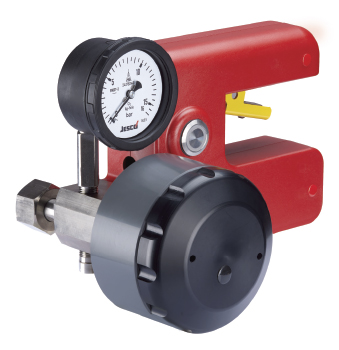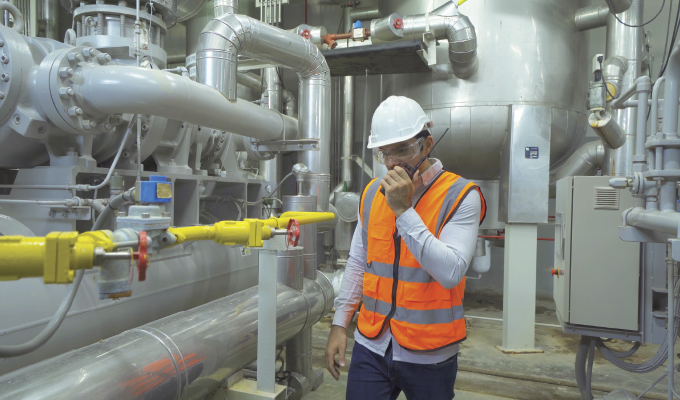Chlorine gas plays a key role in the disinfection of drinking and industrial water. However, handling the chemical can pose considerable health risks–from irritation of the eyes to fatal pulmonary oedema. To further improve occupational safety during use, Lutz-Jesco has developed the VakuStop–a vacuum regulator for dosing systems that is equipped with an emergency stop function to prevent uncontrolled chlorine gas leaks directly at the chlorine gas tank in the event of an emergency.
COMPACT AND COMPATIBLE
The new product was on display last month at the Aquatech 2025 water technology trade fair in Amsterdam. Lutz-Jesco also presented its dosing pumps from the Memdos Smart series for dosing aggressive chemicals as well as electrolysis systems from the Easychlorgen and Minichlorgen series, which safely produce the disinfectant sodium hypochlorite from commercially available salt.
The new VakuStop is based on the C2213/14 vacuum regulator, which Lutz-Jesco has upgraded by adding an automatic safety valve. The system is designed as a compact device that can be fitted to the valve of a chlorine gas tank in just a few simple steps. It can also be connected to a gas warning device or the PLUS safety blow-off valve. In normal operation, the vacuum regulator enables the controlled dosing of up to 10 kilograms of chlorine gas per hour into the piping system provided that there is a sufficient vacuum in the dosing line.
RELIABLE, ADAPTABLE SAFETY MEASURES
The new VakuStop is based on the C2213/14 vacuum regulator, which Lutz-Jesco has upgraded by adding an automatic safety valve. If the negative pressure drops, for example due to a leakage, the chlorine supply is automatically interrupted. If chlorine gas escapes due to a defect in the dosing system, the electric safety valve of the VakuStop closes immediately, preventing any further escape of gas.
This emergency-off function is also triggered in the event of a chlorine alarm, a cable break, if overpressure is detected or if the pushbutton is actuated. In these cases, a stop lever clearly protrudes from the housing as an indicator to signal the interruption. The valve only opens again when an employee operates the lever manually after eliminating the cause of the fault.
“Chlorine gas can present a serious risk to human health – from irritation of the eyes and skin to life-threatening pulmonary oedema. With the new VakuStop, we are helping to minimize the risks involved in handling chlorine gas and further improve occupational safety in the industry,” says Heinz Lutz, CEO of Lutz Holding GmbH.

A COMPREHENSIVE SOLUTION
Lutz-Jesco offers the new VakuStop as part of a comprehensive safety system to increase the safety of larger chlorine gas systems. The centerpiece is a control unit that connects to a gas warning device and up to twelve VakuStops. In the event of a chlorine alarm, the control unit can close all twelve safety valves simultaneously–even during a power failure. The control unit is available with an optional integrated uninterrupted power supply. This uses twelve safety valves to guarantee safety at full loads.
Also, the Memdos Smart series enables low-pulsation dosing of aggressive chemicals for water treatment and is powered by a drive with a stepper motor controlled by a microprocessor, which allows asynchronous running. This enables operation of the motor at a higher speed during priming, thereby creating negative pressure which draws in the liquid more quickly. As a result, the vacuum phase, a dead time with standard motors, is reduced to a minimum. After priming, the stepper motor can then operate at a slower speed to expel the fluid in a controlled and even manner without an abrupt increase in pressure.
ACCURACY MATTERS
The stepper motor enables an almost constant supply stream, which permits the gentle, low-pulsation dosing of aggressive chemicals—without pressure peaks and with minimized dead time. The stepper motor-driven diaphragm dosing pumps will dominate the market in the future when it comes to high-precision and reproducible industrial dosing tasks.
The Memdos Smart is available in eight performance levels—with delivery rates between 2 and 180 liters per hour. The pump is controlled from an intuitive 3.5-inch touch display, which can also be integrated into a higher-level control system. In the era of Industry 4.0, this enables seamless integration of the dosing pump into industrial automation systems.
Steffen Roth is head of development at Lutz-Jesco. Established in 1954, the internationally active family business Lutz-Jesco has advanced to become synonymous for professional fluid management. Today, the Lutz group of companies includes a number of top-performing, medium-sized companies located in Germany and abroad, which operate in the broad field of pump technology, water treatment and disinfection. The Lutz Group has thirteen branch offices and representatives in over eighty countries. For more information, visit www.lutzjescoamerica.com.


